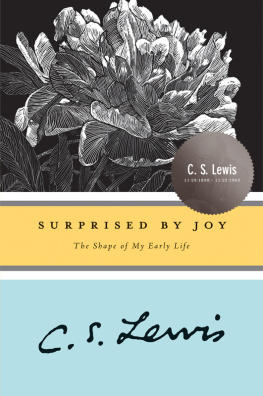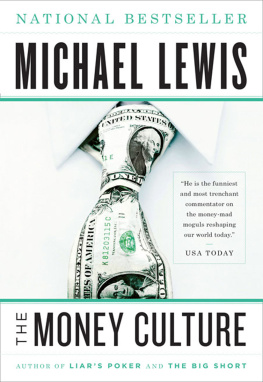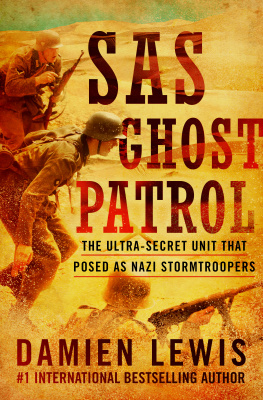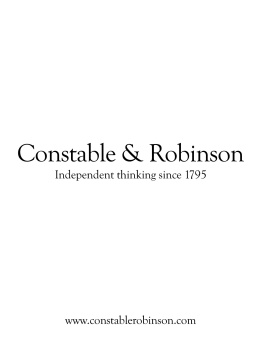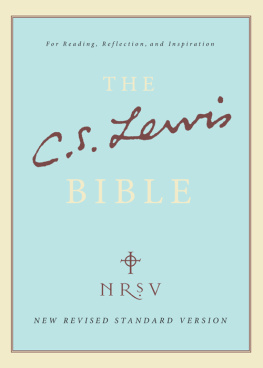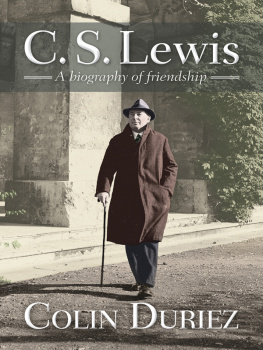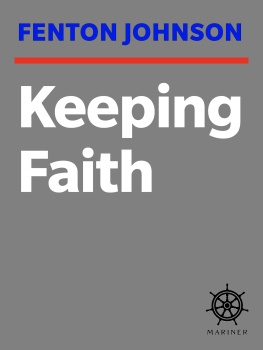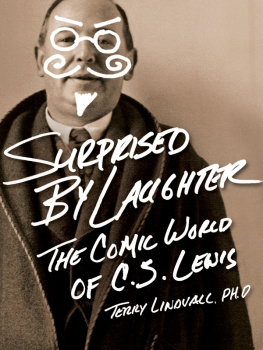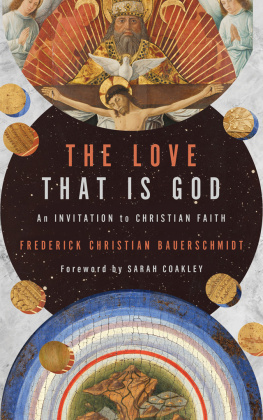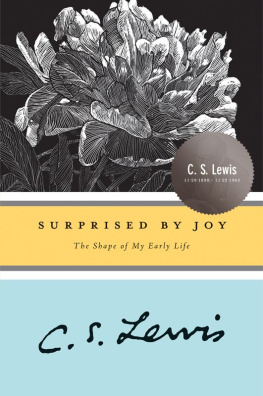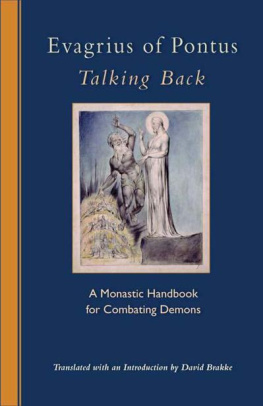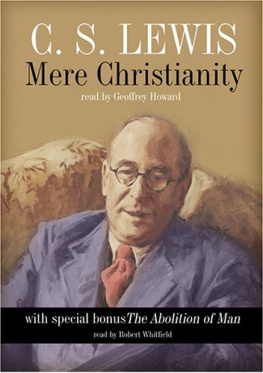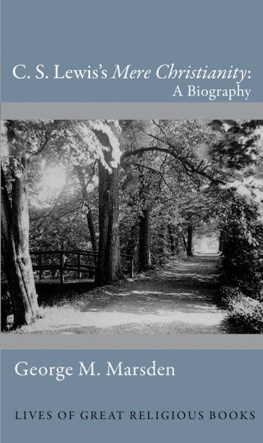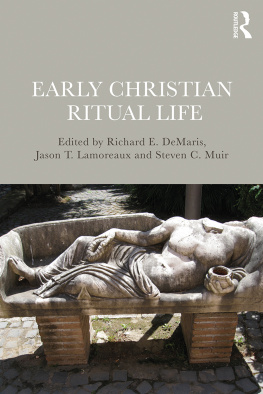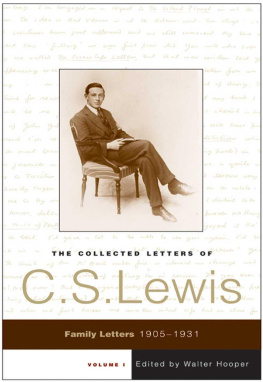Lewis - Surprised by joy: the shape of my early life
Here you can read online Lewis - Surprised by joy: the shape of my early life full text of the book (entire story) in english for free. Download pdf and epub, get meaning, cover and reviews about this ebook. City: Princeton;N.J, year: 2006, publisher: Houghton Mifflin Harcourt, genre: Non-fiction. Description of the work, (preface) as well as reviews are available. Best literature library LitArk.com created for fans of good reading and offers a wide selection of genres:
Romance novel
Science fiction
Adventure
Detective
Science
History
Home and family
Prose
Art
Politics
Computer
Non-fiction
Religion
Business
Children
Humor
Choose a favorite category and find really read worthwhile books. Enjoy immersion in the world of imagination, feel the emotions of the characters or learn something new for yourself, make an fascinating discovery.
- Book:Surprised by joy: the shape of my early life
- Author:
- Publisher:Houghton Mifflin Harcourt
- Genre:
- Year:2006
- City:Princeton;N.J
- Rating:5 / 5
- Favourites:Add to favourites
- Your mark:
- 100
- 1
- 2
- 3
- 4
- 5
Surprised by joy: the shape of my early life: summary, description and annotation
We offer to read an annotation, description, summary or preface (depends on what the author of the book "Surprised by joy: the shape of my early life" wrote himself). If you haven't found the necessary information about the book — write in the comments, we will try to find it.
Lewis: author's other books
Who wrote Surprised by joy: the shape of my early life? Find out the surname, the name of the author of the book and a list of all author's works by series.
Surprised by joy: the shape of my early life — read online for free the complete book (whole text) full work
Below is the text of the book, divided by pages. System saving the place of the last page read, allows you to conveniently read the book "Surprised by joy: the shape of my early life" online for free, without having to search again every time where you left off. Put a bookmark, and you can go to the page where you finished reading at any time.
Font size:
Interval:
Bookmark:
First Mariner Books edition 2012
Copyright 1955 by C. S. Lewis PTE Limited
First Harvest edition published in 1966
All rights reserved
For information about permission to reproduce selections from this book, write to Permissions, Houghton Mifflin Harcourt Publishing Company 215 Park Avenue South, New York, New York 10003.
www.hmhco.com
Library of Congress Catalog Card Number 56-5329
ISBN 978-0-15-687011-5 (pbk.)
e ISBN 978-0-547-54548-6
v7.0915
To
Dom Bede Griffiths, O.S.B.
This book is written partly in answer to requests that I would tell how I passed from Atheism to Christianity and partly to correct one or two false notions that seem to have got about. How far the story matters to anyone but myself depends on the degree to which others have experienced what I call joy. If it is at all common, a more detailed treatment of it than has (I believe) been attempted before may be of some use. I have been emboldened to write of it because I notice that a man seldom mentions what he had supposed to be his most idiosyncratic sensations without receiving from at least one (often more) of those present the reply, What! Have you felt that too? I always thought I was the only one.
The book aims at telling the story of my conversion and is not a general autobiography, still less Confessions like those of St. Augustine or Rousseau. This means in practice that it gets less like a general autobiography as it goes on. In the earlier chapters the net has to be spread pretty wide in order that, when the explicitly spiritual crisis arrives, the reader may understand what sort of person my childhood and adolescence had made me. When the build-up is complete, I confine myself strictly to business and omit everything (however important by ordinary biographical standards) which seems, at that stage, irrelevant. I do not think there is much loss; I never read an autobiography in which the parts devoted to the earlier years were not far the most interesting.
The story is, I fear, suffocatingly subjective; the kind of tiling I have never written before and shall probably never write again. I have tried so to write the first chapter that those who cant bear such a story will see at once what they are in for and close the book with the least waste of time.
C. S. L.
I
Happy, but for so happy ill secured.
MILTON
I WAS BORN in the winter of 1898 at Belfast, the son of a solicitor and of a clergymans daughter. My parents had only two children, both sons, and I was the younger by about three years. Two very different strains had gone to our making. My father belonged to the first generation of his family that reached professional station. His grandfather had been a Welsh farmer; his father, a self-made man, had begun life as a workman, emigrated to Ireland, and ended as a partner in the firm of Macilwaine and Lewis, Boiler-makers, Engineers, and Iron Ship Builders. My mother was a Hamilton with many generations of clergymen, lawyers, sailors, and the like behind her; on her mothers side, through the Warrens, the blood went back to a Norman knight whose bones lie at Battle Abbey. The two families from which I spring were as different in temperament as in origin. My fathers people were true Welshmen, sentimental, passionate, and rhetorical, easily moved both to anger and to tenderness; men who laughed and cried a great deal and who had not much of the talent for happiness. The Hamiltons were a cooler race. Their minds were critical and ironic and they had the talent for happiness in a high degreewent straight for it as experienced travelers go for the best seat in a train. From my earliest years I was aware of the vivid contrast between my mothers cheerful and tranquil affection and the ups and downs of my fathers emotional life, and this bred in me long before I was old enough to give it a name a certain distrust or dislike of emotion as something uncomfortable and embarrassing and even dangerous.
Both my parents, by the standards of that time and place, were bookish or clever people. My mother had been a promising mathematician in her youth and a B.A. of Queens College, Belfast, and before her death was able to start me both in French and Latin. She was a voracious reader of good novels, and I think the Merediths and Tolstoys which I have inherited were bought for her. My fathers tastes were quite different. He was fond of oratory and had himself spoken on political platforms in England as a young man; if he had had independent means he would certainly have aimed at a political career. In this, unless his sense of honor, which was fine to the point of being Quixotic, had made him unmanageable, he might well have succeeded, for he had many of the gifts once needed by a Parliamentariana fine presence, a resonant voice, great quickness of mind, eloquence, and memory. Trollopes political novels were very dear to him; in following the career of Phineas Finn he was, as I now suppose, vicariously gratifying his own desires. He was fond of poetry provided it had elements of rhetoric or pathos, or both; I think Othello was his favorite Shakespearean play. He greatly enjoyed nearly all humorous authors, from Dickens to W. W. Jacobs, and was himself, almost without rival, the best raconteur I have ever heard; the best, that is, of his own type, the type that acts all the characters in turn with a free use of grimace, gesture, and pantomime. He was never happier than when closeted for an hour or so with one or two of my uncles exchanging wheezes (as anecdotes were oddly called in our family). What neither he nor my mother had the least taste for was that land of literature to which my allegiance was given the moment I could choose books for myself. Neither had ever listened for the horns of elfland. There was no copy either of Keats or Shelley in the house, and the copy of Coleridge was never (to my knowledge) opened. If I am a romantic my parents bear no responsibility for it. Tennyson, indeed, my father liked, but it was the Tennyson of In Memoriam and Locksley Hall. I never heard from him of the Lotus Eaters or the Morte dArthur. My mother, I have been told, cared for no poetry at all.
In addition to good parents, good food, and a garden (which then seemed large) to play in, I began life with two other blessings. One was our nurse, Lizzie Endicott, in whom even the exacting memory of childhood can discover no flawnothing but kindness, gaiety, and good sense. There was no nonsense about lady nurses in those days. Through Lizzie we struck our roots into the peasantry of County Down. We were thus free of two very different social worlds. To this I owe my lifelong immunity from the false identification which some people make of refinement with virtue. From before I can remember I had understood that certain jokes could be shared with Lizzie which were impossible in the drawing room; and also that Lizzie was, as nearly as a human can be, simply good.
The other blessing was my brother. Though three years my senior, he never seemed to be an elder brother; we were allies, not to say confederates, from the first. Yet we were very different. Our earliest pictures (and I can remember no time when we were not incessantly drawing) reveal it. His were of ships and trains and battles; mine, When not imitated from his, were of what we both called dressed animalsthe anthropomorphized beasts of nursery literature. His earliest storyas my elder he preceded me in the transition from drawing to writingwas called The Young Rajah. He had already made India his country; Animal-Land was mine. I do not think any of the surviving drawings date from the first six years of my life which I am now describing, but I have plenty of them that cannot be much later. From them it appears to me that I had the better talent. From a very early age I could draw movementfigures that looked as if they were really running or fightingand the perspective is good. But nowhere, either in my brothers work or my own, is there a single line drawn in obedience to an idea, however crude, of beauty. There is action, comedy, invention; but there is not even the germ of a feeling for design, and there is a shocking ignorance of natural form. Trees appear as balls of cotton wool stuck on posts, and there is nothing to show that either of us knew the shape of any leaf in the garden where we played almost daily. This absence of beauty, now that I come to think of it, is characteristic of our childhood. No picture on the walls of my fathers house ever attractedand indeed none deservedour attention. We never saw a beautiful building nor imagined that a building could be beautiful. My earliest aesthetic experiences, if indeed they were aesthetic, were not of that kind; they were already incurably romantic, not formal. Once in those very early days my brother brought into the nursery the lid of a biscuit tin which he had covered with moss and garnished with twigs and flowers so as to make it a toy garden or a toy forest. That was the first beauty I ever knew. What the real garden had failed to do, the toy garden did. It made me aware of naturenot, indeed, as a storehouse of forms and colors but as something cool, dewy, fresh, exuberant. I do not think the impression was very important at the moment, but it soon became important in memory. As long as I live my imagination of Paradise will retain something of my brothers toy garden. And every day there were what we called the Green Hills; that is, the low line of the Castlereagh Hills which we saw from the nursery windows. They were not very far off but they were, to children, quite unattainable. They taught me longing
Next pageFont size:
Interval:
Bookmark:
Similar books «Surprised by joy: the shape of my early life»
Look at similar books to Surprised by joy: the shape of my early life. We have selected literature similar in name and meaning in the hope of providing readers with more options to find new, interesting, not yet read works.
Discussion, reviews of the book Surprised by joy: the shape of my early life and just readers' own opinions. Leave your comments, write what you think about the work, its meaning or the main characters. Specify what exactly you liked and what you didn't like, and why you think so.

